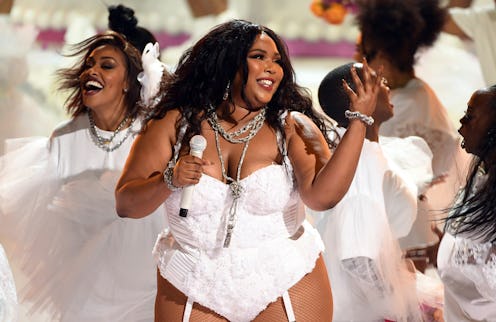Life
Lizzo Opened Up About Her Depression On Instagram & Her Message Is Required Viewing

As an artist, Lizzo — with her incredible talent and the sheer force of her self-love — has become a trailblazer in an industry that’s often hostile to fat Black women like her. And the singer has recently used her platform to do another revolutionary act and open up about her experiences with depression.
In an Instagram video posted on June 21, Lizzo got candid with her followers about mental health and how she realized that “being emotionally honest can save your life.”
Asking her followers, “What do you love about yourself in those moments of darkness?” Lizzo continues a vital conversation about self-acceptance that she’s been having with her fans. Lizzo’s messages about self-care and self-love resonate with lots of women, but it’s especially relevant to Black women. Many people experience painful depression symptoms — 300 million people globally, according to the World Health Organization — but not everyone is given the same amount of freedom to express those feelings and seek out support.
In an op-ed for NBC News, Lizzo wrote that black women are “so strong, because of all that we have been put through, and how little we're sought after and looked out for. So, black women end up like, I got it. I don't need help. I'm handling this. That's why I tried to be strong for so long.”
For Black women like myself and Lizzo, being publicly vulnerable about our mental health can feel like taking a leap into the unknown, as media is saturated with stereotypes of the “strong Black women” we’re supposed to aspire to. But Black women aren't superheroes; we’re human beings who feel pain and sadness, who get ill, who need support... just like everyone else.
But when we deviate from this impossible standard and actually show vulnerability, sometimes we’re perceived as “weak” or “crazy.” This dynamic is even more pronounced for fat Black women, whose mental health can be negatively impacted by both racial bias and fatphobia, in addition to discrimination based on other facets of identity.
In her Instagram post, Lizzo also talked about how sadness is not an inherently negative feeling for her, saying "...I know that because of this sadness, I'm going to be able to feel joy… sadness is a wave... and my sadness can be as temporary as my joy." And Lizzo’s right. Healing isn’t linear, and I appreciate how she shows us that working on ourselves is a journey, not a sprint.
When women like Lizzo feel safe enough to show emotional honesty and seek help for mental health issues, the results can be transformative. Having struggled with suicidal ideation, anxiety, and depression for many years, I’m not sure if I would be here if I didn’t feel that I could be vulnerable with my friends and family, where like Lizzo, I was “covered in love.”
In the caption of a previous video she posted, Lizzo said that "I self-love so hard because everything feels like rejection.” In a world that constantly attempts to reject women by telling them that they aren’t worthy of respect, or that they must alter themselves to be accepted, we need self-love. In this way, self-love isn’t, as Lizzo would say, merely indulging in “mimosas and spa days” but it’s a lifeline.
Lizzo constantly reaches for this lifeline in her music and in her performances, especially her recent performance at the BET awards, where she and her dancers donned bridal costumes as the ultimate display of radical self-love.
Lizzo is inspiring a whole generation of women — especially fat-bodied Black women — who have found that her presence in the entertainment world is joyful and revolutionary.
Lizzo resonates with the public not just because of her musical abilities, but also her relatability, vulnerability, and commitment to uplifting the most overlooked people in our society. So many of these narratives get silenced in our culture, but speaking about them openly helps people feel represented and truly seen. And feeling seen helps give people the strength go on journeys like Lizzo's — journeys towards healing and self-acceptance.
If you or someone you know is seeking help for mental health concerns, visit the National Alliance on Mental Health (NAMI) website, or call 1-800-950-NAMI(6264). For confidential treatment referrals, visit the Substance Abuse and Mental Health Services Administration (SAMHSA) website, or call the National Helpline at 1-800-662-HELP(4357). In an emergency, contact the National Suicide Prevention Lifeline at 1-800-273-TALK(8255) or call 911.